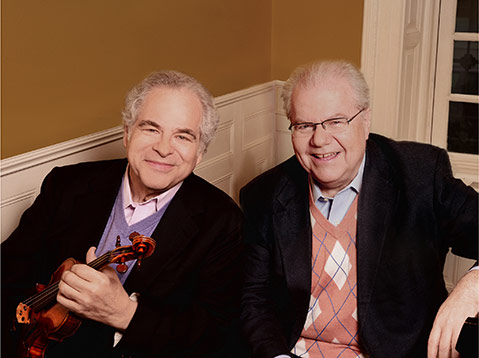Itzhak Perlman and Emanuel Ax
UCSB Arts & Lectures Presents Perlman-Ax Duo at the Granada

One way that classical music touches the limits of human consciousness is through the degree to which experienced musicians embody generations of knowledge. In a great performance, the thoughts and muscle memories of the musicians onstage coalesce around an ideal object, the score, which exists outside of time, yet that engagement is comprehensively enhanced by personal connections not only to the music and to each other but also to a shared heritage of teachers and collaborators. When legendary players such as Itzhak Perlman and Emanuel Ax come together, the music they make carries the charge of their combined conscious intellects and an intangible quality emanating from the tacit knowledge they have acquired from great artists of the past. They, in turn, transmit this unspoken knowledge, the feeling of the piece, forward to listeners and fellow musicians in the present and the future.
All this is by way of saying that when Itzhak Perlman and Emanuel Ax enter the Granada Theatre on Thursday, January 21, to play a recital for UCSB Arts & Lectures, they come bearing the incalculable asset of access to deep musical truths. In each concert they play, their performances bring to life a tradition that extends back hundreds of years, all the way to the great composers themselves.
In the case of this particular recital, that means Richard Strauss, Gabriel Fauré, and Wolfgang Amadeus Mozart. Perlman and Ax have been making music together since they were both students at Juilliard, and between them, their record of collaboration with the greatest orchestras and performers of the 20th and 21st centuries is unmatched. Nevertheless, it took them until 2015 to record together as a duo, even after playing hundreds of recitals together, and collaborating on several celebrated recordings as a trio with another old friend, Yo-Yo Ma.
Talking by phone last week from San Francisco, where he was scheduled to perform Beethoven’s Concerto No. 5, “Emperor” with the San Francisco Symphony, Ax remarked that the process of recording the Strauss Sonata for Violin and Piano in E-flat, Op. 18, and the Fauré Sonata for Violin and Piano No. 1 in A Major, Op. 13 with Perlman did offer a different perspective from that provided by the many times the two have performed these pieces live. “You get a chance to reflect in the studio. There’s a back and forth, going from listening to playing and then listening again, and of course that’s instructive” he said.
Asked to compare the two works, Ax continued, saying, “In the Strauss sonata, you can already hear some of the things that will become prominent in his orchestral music, and as with so much of Strauss, it is quite programmatic, meaning that you can easily imagine that the music is telling some kind of story. Fauré on the other hand, is more lyrical, and the changes are more light and subtle. I always feel with Fauré in his harmonic sense there’s a certain kinship with Schubert.”
For an international figure such as Ax, the touring road never seems to end, but there are compensations to be had in the company he keeps. Asked what he would be doing next, he said that the spring would find him forming another duo, this time with Yo-Yo Ma, in order to revisit the complete Beethoven sonatas for cello and piano. We are fortunate indeed to attract such talent to our concert halls, and all those who attend the recital are sure to come away feeling that they have been witness to music history.
4·1·1
Itzhak Perlman and Emanuel Ax will perform for UCSB Arts & Lectures Thursday, January 21, 7 p.m. (note early time), at the Granada Theatre (1214 State St.). For tickets and information, see artsandlectures.sa.ucsb.edu or call (805) 893-3535.



